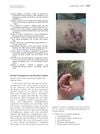January 2015 in “Indo American Journal of Pharmaceutical Research” Mesotherapy uses small injections to improve skin, reduce fat, and treat hair loss effectively and quickly.
 May 2014 in “Journal of Investigative Dermatology”
May 2014 in “Journal of Investigative Dermatology” Scientists developed tools to observe hair regeneration in real time and assess skin health, using glowing mice and light-controlled genes.
January 2013 in “Российский журнал кожных и венерических болезней” The treatment improved hair growth and reduced hair loss.
 January 1998 in “Current Therapeutics”
January 1998 in “Current Therapeutics” Different causes of hair loss require specific treatments, and most men and women will experience some form of hair thinning as they age.
April 2023 in “Journal of Investigative Dermatology” cp-asiAR may effectively treat hair loss by targeting androgen receptors.
September 2022 in “International Journal of Trichology” Both microneedling and injections are equally effective for treating alopecia areata.
September 2022 in “Journal of The American Academy of Dermatology” Combining dutasteride mesotherapy with oral minoxidil is more effective for hair loss than using oral minoxidil alone.
 April 2024 in “MRIMS journal of health sciences”
April 2024 in “MRIMS journal of health sciences” Using growth factor injections and minoxidil together can significantly improve hair growth in people with hair loss.
 7 citations,
January 2015 in “International Journal of Trichology”
7 citations,
January 2015 in “International Journal of Trichology” Applying minoxidil on the scalp after mesotherapy injections caused temporary swelling.
1 citations,
March 2023 in “Pharmaceutics” PBMCsec can help reduce and improve thick skin scars.

A 72-year-old man was diagnosed with a rare skin form of Rosai-Dorfman disease after years of misdiagnosis.
 231 citations,
October 1999 in “Journal of Clinical Investigation”
231 citations,
October 1999 in “Journal of Clinical Investigation” Activating the Sonic hedgehog gene in mice can start the hair growth phase.
 86 citations,
August 2021 in “Polymers”
86 citations,
August 2021 in “Polymers” Microneedles are effective for drug delivery, vaccinations, fluid extraction, and treating hair loss, with advancements in manufacturing like 3D printing.
36 citations,
January 2015 in “Clinical and Translational Allergy” Humans and pets share similar allergy mechanisms, and studying pet allergies can help treat both human and animal allergies.
 22 citations,
July 2019 in “PLOS ONE”
22 citations,
July 2019 in “PLOS ONE” Skin lymphatic vessels are essential for hair growth.
18 citations,
June 2020 in “Dermatologic Therapy” FCO2 laser is a better treatment for alopecia areata than intralesional steroids.
 6 citations,
July 2009 in “Biomolecules & therapeutics”
6 citations,
July 2009 in “Biomolecules & therapeutics” Combining MSM with MAP significantly promotes hair growth.
 1 citations,
January 2020 in “E3S web of conferences”
1 citations,
January 2020 in “E3S web of conferences” The study found that injecting spores directly into rabbit skin effectively caused fungal skin infections, with symptoms worsening over time.

Fat tissue can potentially treat a common form of hair loss called androgenic alopecia.
 January 2021 in “Journal of the European Academy of Dermatology and Venereology”
January 2021 in “Journal of the European Academy of Dermatology and Venereology” PrEP doesn't increase STI risk in high-risk men, anti-androgen drugs may lower ICU admission for male COVID-19 patients, a 3-point injection is better for crow's feet, and the 'Geriatric-8' tool could help assess frailty in older skin cancer patients.
 December 2019 in “Pubvet”
December 2019 in “Pubvet” The document concludes that atopic dermatitis in dogs is managed with various treatments including antipruritics, supplements, and possibly immunotherapy.
 April 2017 in “Journal of Investigative Dermatology”
April 2017 in “Journal of Investigative Dermatology” Certain microRNAs may protect against hair loss in alopecia areata and could be potential treatment targets.
 July 2014 in “Elsevier eBooks”
July 2014 in “Elsevier eBooks” The document concludes that various hypersensitivity diseases in horses can be diagnosed and treated with methods like immunotherapy and medication, and early aggressive treatment is crucial for severe diseases like equine cutaneous pythiosis.
 June 2011 in “International Journal of Dermatology”
June 2011 in “International Journal of Dermatology” A man's red tattoo caused a skin reaction and hair loss in his beard, which improved after treatment.
 August 2001 in “Journal of Cutaneous Medicine and Surgery”
August 2001 in “Journal of Cutaneous Medicine and Surgery” Prednisone has risks for lupus patients, isotretinoin is safe for mental health, transplant patients risk skin cancer, and various treatments are effective for specific skin conditions.
 7 citations,
November 2022 in “Communications biology”
7 citations,
November 2022 in “Communications biology” Keratin injections can promote hair growth by affecting hair-forming cells and tissue development.
6 citations,
June 1994 in “Journal of Animal Science” None of the tested compounds created a permanent mark on cattle.
 November 2024 in “Journal of Drugs in Dermatology”
November 2024 in “Journal of Drugs in Dermatology” Injectable minoxidil is a promising, effective treatment for hair loss.
 April 2023 in “Experimental Dermatology”
April 2023 in “Experimental Dermatology” Human dermal papilla cells can increase hair thickness and number in pigs with just one injection.
 31 citations,
April 2010 in “British journal of dermatology/British journal of dermatology, Supplement”
31 citations,
April 2010 in “British journal of dermatology/British journal of dermatology, Supplement” Frontal fibrosing alopecia can cause sudden hair loss on limbs, similar to scalp hair loss.




















